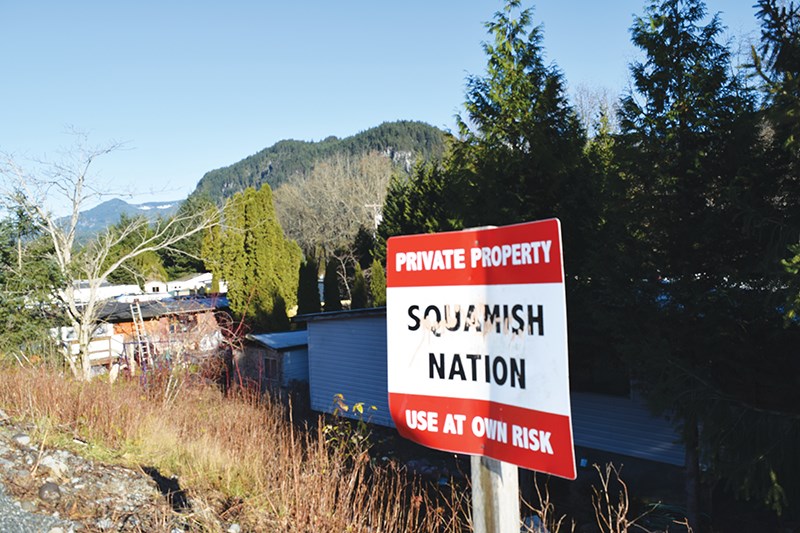Christine Crawford says she’s living in housing purgatory.
Crawford bought her home in Riverside Trailer Park in Brackendale more than a decade ago, but for the past three years, she and a dozen of her neighbours have lived in fear of being kicked out, she said.
The park is on Squamish Nation land and half the park’s homeowners, who live on what is called Lot 6, have been told by the Nation they are technically “trespassing.”
“I don’t want to do any updates or major repairs because I might get kicked out,” Crawford said. “If they say ‘go, go now,’ I can’t pick this [house] up and move it. I could lose everything.”
The issue is complicated and involves a land dispute within the Squamish Nation.
In Crawford’s case she bought her home, which sits at the entrance to the park, in 2006. When she bought, there was a 1998 lease agreement in effect that laid out rules and regulations of living in the park. The lease agreement states, “The tenant may sell his/her mobile home at any time.”
At the time, former Squamish Nation chief Bill Williams collected pad fees from Crawford.
The trouble began in December of 2012 when trailer park homeowners, including Crawford, received a letter from the Squamish Nation that said the park was now under Squamish Nation management and tenants were trespassing.
The Squamish Chief has a copy of the letter.
“The Williams family was granted a Certificate of Possession under the Indian Act which gives them a right of possession of Lots 1 and 2 on the Reserve,” reads the Dec. 19, 2012 letter from the Nation. “However, it has recently come to the Squamish Nation’s attention that the Riverside Trailer Park is being operated not only on Lots 1 and 2, but also on Lot 6… [which] belongs exclusively to the Squamish Nation. No Certificate of Possession has been granted in respect to Lot 6 and the Williams family has no legal rights or ability to use or occupy these lands.”
The letter goes on to say that any agreement the owners had with the Williams family is not legal and homeowners “are therefore in trespass on Lot 6.”
The Squamish Chief spoke with another owner at the park who did not want to be named in this story but who provided a copy of the same letter about trespassing that was sent to Crawford.
The letter concludes that the Nation would be taking over the park’s management and as a condition of being able to stay, future pad fees must be sent to Squamish Nation.
In May of 2013, Crawford decided to sell her home. Her real estate agent asked for the rules and regulations of the park so Crawford phoned the Nation to see if the 1998 rules still applied.
“They told me that those rules and regulations were in effect and nothing had changed,” Crawford said.
In February and April of 2014, Crawford had potential buyers of her home lined up.
But both buyers backed out at the last minute when no documentation or lease agreement could be obtained from the Nation.
“I was furious,” Crawford said of the inability to sell her house.
She contacted the Squamish Nation to complain about the situation and in April of 2014 was sent an email from Tom Butler at the Squamish Nation, which was forwarded to The Squamish Chief.
“Mobile home owners who are living at Riverside Trailer Court are living at the park on a month-to-month basis. The land is owned by the Squamish Nation. The future use of the land is to be determined by the Nation,” read the April 30, 2014 email from Butler. The Squamish Chief attempted to contact Butler but did not receive a reply by press deadline.
For his part, Williams told The Squamish Chief his family had possession of the trailer park land for about 103 years until the Squamish Nation took it in 2012.
“So from 1900 to 2012 our family, the Williams family, has been using that property.”
His grandparents cleared the land and used it as a farm, Williams said, starting in about 1910.
“In the Indian Act, it does say that if you clear the land and you settle on the land for more than 10 years, then it is considered by the Department of Indian Northern Affairs [now Aboriginal Affairs] your land, if nobody sends a letter to them saying that the individual has been homesteading on their property,” said Williams, adding that when his grandfather settled on the land, there was no petition or letter that the land had been previously claimed.
Williams’ parents established the trailer park on the land in about 1970, he said.
In 2012 the Squamish Nation did an inventory of all its land and decided to take back Lot 6 the Williams’ land, he said.
Williams said the issue comes down to a technicality from generations ago.
“In the Indian Act, it says if the Indian government does not pass a motion that the land is yours, then the Indian Band can take that land back and put it in its inventory and reallocate it,” Williams said.
Williams said he understands the owners are in limbo and he feels the same way.
“There is a complication. I certainly want to resolve this in the best way possible without going to court or anything like that, and I think it can be. But the council of the day have to sit down and explain why they grabbed the land when a family had been using it for over 103 years,” he said.
Squamish Nation’s Chief Ian Campbell commented briefly when contacted.
“Squamish Nation is currently conducting a legal review of this matter,” Campbell said by email.




